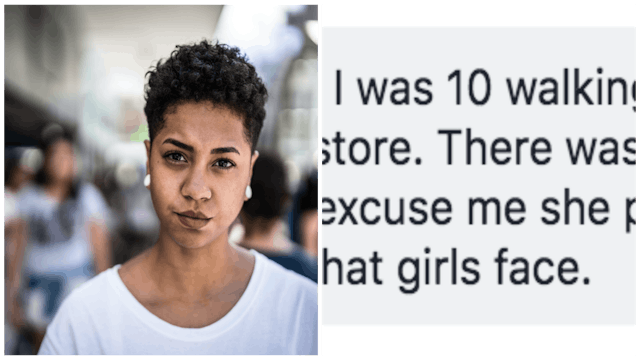POC Are Sharing When They Were Called A Racial Slur For The First Time

I was in the same grade that my daughter is in now — 4th grade — when I was called a nigger for the first time. A girl who I thought was my friend was mad that I wouldn’t give her my only pencil because she didn’t have one. When she said it, the word tumbled out of her mouth with such venom that I remember feeling afraid. I had never seen that side of my friend. She changed so quickly that I knew she believed that I was what she’d called me, and that I’d only been that to her all along. It was a very sad day.
Since then I’ve been called a nigger more times than I can count. It’s been yelled at me for driving too slow, for taking too long placing my order at the bakery, and because I asked a white guy to stop grinding on me at the club. Among other things. I’ve heard that over time people get immune to being called racial slurs. That we understand that it’s just a part of the experience of being a person of color in America. That’s not true for me. I remember every single time someone called me a racial slur. And it still hurts.
Unfortunately, being called a racial slur is just a rite of passage for people of color in this country. It doesn’t matter where we are, what we’re doing, or even how old we are, racists are everywhere here and they never want us to forget it. And we don’t. If you ask a black person the first time they were called a nigger, they’ll remember.
A Facebook post showed that most people of color never forget the first time they were called a slur.
Here are a few unfortunate memories from that post:
It doesn’t matter how old we are. Even babies aren’t immune to racism.
And even little kids aren’t immune to being racist. You have to worry where they’re learning this type of behavior from. But, really, we know.
We don’t even have to be doing anything to be subjected to it. I’ve been called a nigger because I didn’t have a pencil sharpener for another student to use. Someone called me it because I told them I didn’t work at the store when they mistook me for an employee.
And if there’s no consequence for being racist, why would anyone change? So many people say that they don’t see color, but really what they mean is they don’t want to deal with racism.
So, back to questioning where kids learn about calling people of color nasty slurs. Well, it obviously starts at home.
It might not even be the parents. It could be the media that kids are allowed to access. This is why it’s important for parents to acknowledge that racism is a real issue so they can talk to their children. Also, make sure you know what your children are engaging with online and on television!
Kids should be singing nursery rhymes and playing games. It’s not normal for a child to know and use racial slurs.
Racial slurs are commonplace in our country now, so it’s easy for kids to pick up on them.
This isn’t an issue from the past, either. Things are not changing. Racist people are still raising racist children. It makes me afraid for my own children.
Just so that we’re clear, people of color don’t just remember the first time they’re called a racial slur. We remember every time. Every. Single. Time. You never get used to it, and it’s never not scary.
Is there any hope for this country? Sure there is, but not in this generation. I haven’t given up on my faith in humanity. I’m realistic, though. I know that America’s racism is deep rooted and longstanding and it’s going to take a lot to change. We can start by having conversations in our home with our own children. Actually say these disgusting words out loud to them and express to our children about why they’re so hurtful and traumatizing.
We also need to stop saying we don’t see color. Introduce our kids to the idea that it’s okay to be different, we should appreciate and respect each other’s differences, and talk about that what makes humanity so special. We don’t need to just see color, we need to acknowledge it and celebrate it. Seeing color is critical to increasing our acceptance.
White people, y’all need to stop being so afraid to point out how we aren’t alike, and embrace it. Be willing to face your own biases and how you might have encouraged racism by not addressing it in your home (yes, even with your beloved grandfather) and workplace.
If we are going to see change, we need allies who aren’t afraid to get into the trenches and stand up for what’s right.
This article was originally published on